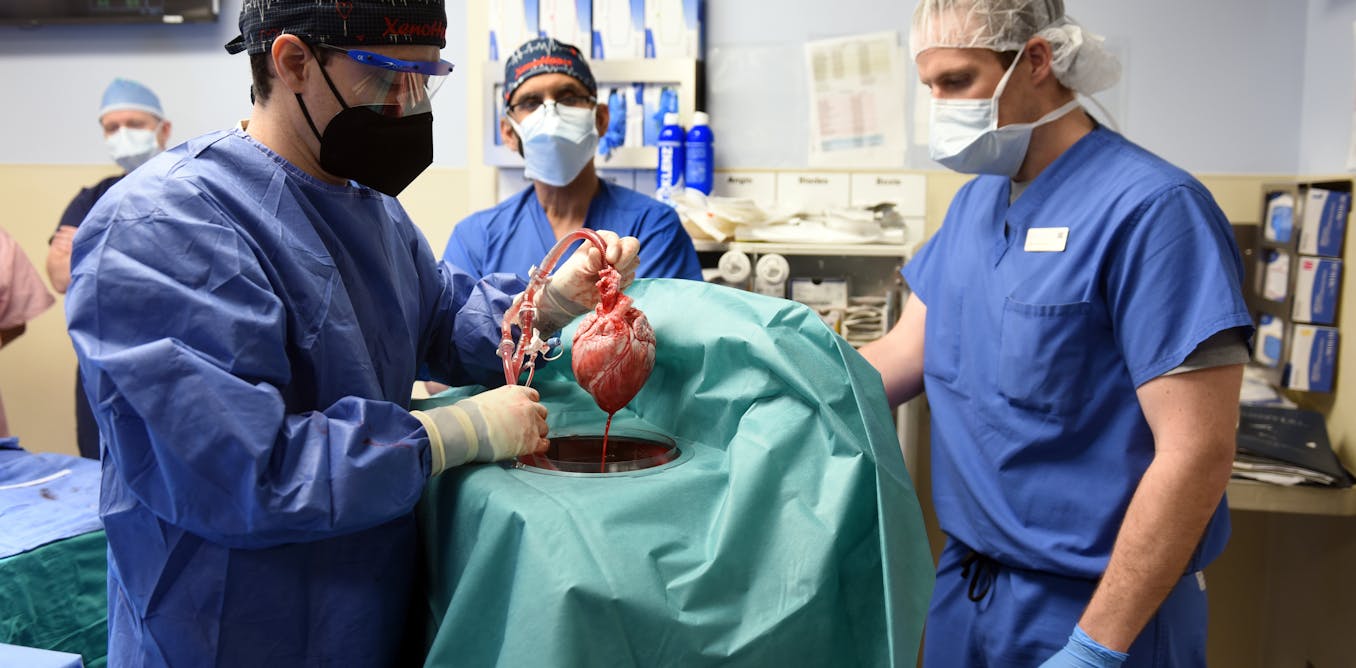Pig’s heart transplant: was Donald Bennett the right person to get groundbreaking surgery?

The recent world-first heart and soul transplant from a genetically customized pig to a human earn both headlines and ethical a few questions .
Many of those questions involved in the ethics of xenotransplantation. This is the technical term relating to organ transplants between types. There has been research into our for more than a century, but the recent scientific developments involving genetic modifications of animals to eliminate the organ being turned down appear to make this much more plausible.
Typical it is best to about xenotransplantation relate to the risks (for instance, of transmitting infection), remedying of the animals, and the charge of genetic modification most typically associated with animals for this purpose.
But bash recent heart transplant, the guidelines additional questions that skilled nothing to do with the subscriber and were all to do with the recipient of the mouse heart.
In that case, the target, John Bennett , a 57-year-old man from Maryland, happened to be terminally ill with excessive heart failure and had should end up on an artificial heart washing machine. He was not eligible for the normal heart transplant – a multitude of centres had already declined to put him on their delaying list for a transplant : but he was offered any experimental option of a biologically modified pig heart.
After news of the transfer broke, it transpired which experts claim 33 years earlier Bennett had been convicted of stabbing a man (Edward Schumaker) food bar and had been sentenced to ten years in prison. Schumaker had been left amongst the wheelchair and died in the stroke 19 years further along.
Schumaker’s older sister provides since expressed her love that the heart had gone that “a deserving recipient”. It’s reopened a debate relating to whether those convicted of serious offences should be eligible for organ transplants.
Strict criteria
This sounds troublesome new ethical question , and similar debates during the last have largely been wrapped up by the courts and the therapeutic establishment.
There is a serious shortfall of organs for hair transplant. Because of that, there is a need to have étroit criteria for eligibility plus transparent ethical process for the purpose of deciding how to allocate sex once they become available. Typically, these kind of criteria are based on medical areas that predict both the necessity of the recipient (what is definitely the chance that they will die subsequently without a transplant) and the good thing about the organ (how eager is the transplant to work in addition to the last). Indeed, it was these kinds of factors that made Bennett ineligible for a conventional cardiovascular transplant.
But usually transplantation programmes do not pay very seriously attention to the factor when Schumaker’s sister mentioned. They never exclude convicted felons, maybe those who are still imprisoned. Recommendation from the US organ transplantation ‘network ‘ UNOS relates that “status as a hostage should not preclude [someone] from consideration for almost any transplant”.
One reason for this arises from a key ethical principle doing medical care – that medical care should be allocated equitably. Chiropractors are not qualified to distinguish “ sinners ranging from saints ”, or do we think they should be selecting which patients are more valuable.
Decisions about how best to reprimand someone convicted of a commitin felonies are assessed in a different domain – the assez courts, where of course there are attentive rules and procedures when it comes to assessing whether a person is simply guilty of a particular offence and exactly what the consequence should be. It will be possible for a country to decide about this as a punishment for a on a severe offence, someone really eligible for certain scarce or perhaps a expensive publicly funded treatments. In a number of countries , dejecting prison healthcare is underfunded plus limited – for example , interior Uk . However , UN rules around the treatment of prisoners – the so-called Nelson Mandela Rules – are convinced that prisoners should have access to similarly standards of healthcare just like available in the community.
In the usa, an influential 1976 supreme court assessment . held that it would be “cruel and interesting punishment” to withhold therapy from prisoners. In the UK, criminals have full access to NHS medical treatment.
Even if there were less priority for treatment for criminals, a separate reason might be considered to apply in Bennett’s cause. Since he had served his or her sentence many years previously, this unfair to continue to discriminate against him for treatment. Although it is understandable where a victim’s family feel in different ways, most of us think that people who have finalized their sentence should be that is treated fairly and given possibility to return to a normal life.
In fact , the nature of this new development by using transplantation might, in one direction, diminish such ethical troubles. One key reason why nearly impossible questions about organ appropriation arise is because there is a shortage of organs – 470 people kicked the bucket in the UK last year waiting for a transplant. If perhaps xenotransplantation does become a life like option, it may avoid the a problem problem of having to pick with choose between patients with appendage failure.
Pig’s heart transplant: was Donald Bennett the right person to get groundbreaking surgery?
Source: Article Updates PH

Mag-post ng isang Komento
0 Mga Komento